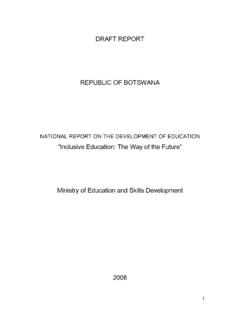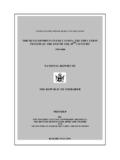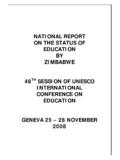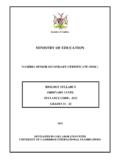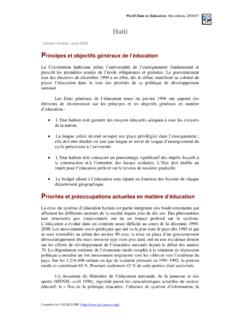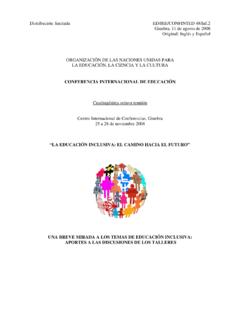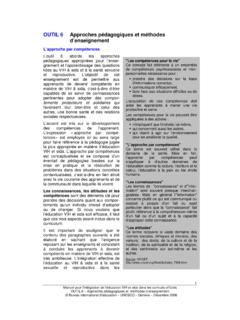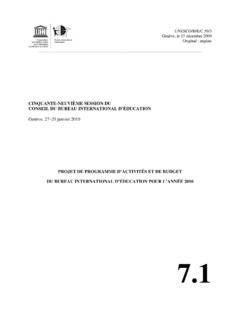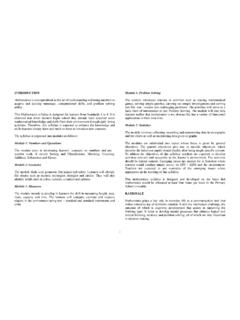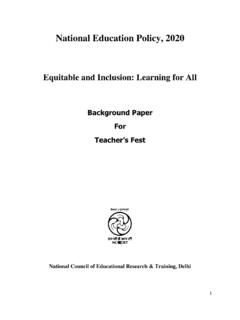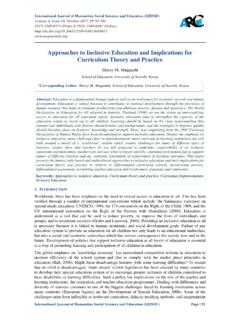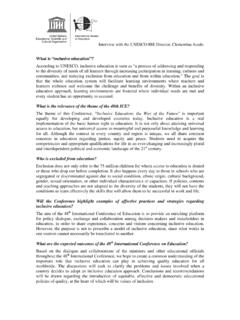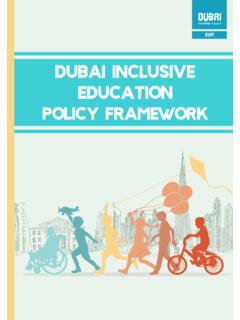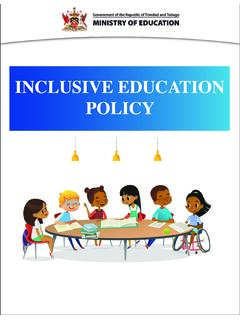Transcription of Inclusive education in Finland - International Bureau of ...
1 Finland Regional Preparatory Workshop on Inclusive education Eastern and South Eastern Europe Sinaia, Romania, 14 16 June 2007 UNESCO International Bureau of education Finnish National Board of education Preschool and Basic education Development Planning Specialist Ritva J rvinen IBE/ Romania CURRENT TRENDS IN Inclusive education IN Finland Inclusive education today In many ways the Finnish school system is Inclusive by nature. Development towards the school for every-one has begun years ago. Legislation that directs the Finnish education system is based on equal-ity, justice of learning and on the principle of inclusion. The most important goal of education is to support growth and development of unique personality in all possible ways. Schooling is provided first and foremost in context with mainstream education . Also the main goal of education is to guarantee the best possible learning to everyone.
2 Every child is important and all the decisions are made from the children point of view. In this presentation concept of Inclusive education means that the education is organised so that every pupil gets an adequate and well-timed support to her/his learning and growth. It is a question of both developing the system and structures and developing the school culture and pedagogical methods that promote the success of all pupils in their studies. Tools for Inclusive education 1. education policy Administration system The Finnish Parliament decides on educational legislation and the general principles of education pol-icy. The government, the Ministry of education , and the Finnish National Board of education are re-sponsible for the implementation of this policy at the central administration level. The government participates in the costs of schools by paying the so-called statutory government transfer to the educa-tion provider.
3 The role of the Ministry is to prepare strategic policy guidelines for education , to prepare and share budget and to prepare educational laws. The main responsibility of NBE is to prepare and decide about the National Core Curriculum for the Comprehensive School, for Upper Secondary Gen-eral and Vocational education and for Adult education . NBE is also responsible for the development of the Finnish education system. Universities have autonomy and they are guided straight by the Minis-try of education . Basic education is governed by the Basic education Act (628/1998) and Basic education Decree (852/1998) and the Government Decree on the General National Objectives and Distribution of Les-son Hours in Basic education (1435/2001). These regulations stipulate such matters as the core sub-jects taught to all pupils, and the distribution of teaching hours between various subjects.
4 The core sub-jects taught to all pupils in the basic education syllabus are the mother tongue and literature (Finnish or Swedish), the other official language, one foreign language, environmental studies, health education , religion or ethics, history, social studies, mathematics, physics, chemistry, biology, geography, physical education , music, art and crafts, and home economics. Guidance counselling must also be provided for students. In addition, optional subjects are taught, which are determined locally by local authorities and schools. education Policy Definitions The key objective of Finnish educational policy is to provide all citizens with equal access to education regardless of age, place of residence, economic circumstances, sex, or mother tongue. education is considered to be a fundamental right of all citizens. Statutes guarantee everyone residing in Finland not only Finnish citizens the right to free basic education .
5 They also prescribe compulsory basic edu-cation. The basis of instruction is Finnish culture, which has developed in interaction with indigenous, Nordic, and European cultures. In the instruction, special national and local attributes, the national languages, the two national churches, the Sami as an indigenous people and national minorities must be taken into consideration. The instruction must also take into account the diversification of Finnish culture through the arrival of people from other cultures. The instruction helps to support the formation of the pupil's own cultural identity, and his or her part in Finnish society and a globalizing world. The instruction also helps to promote tolerance and intercultural understanding. Basic education helps to increase both regional equality and equality among individuals. In the instruction, the diversity of learners is taken into consideration, and gender equality is promoted by giving girls and boys the ability to act on the basis of equal rights and responsibilities in society, working life, and family life.
6 In basic education , instruction in the different subjects is nondenominational and politically neutral. In the local basic education curriculum, the values that underlie education are to be specified. They are to be incorporated into the objectives and contents of basic education , and into everyday activity. Basic education is part of fundamental educational security. It has both an educational and an instructional mission. Its task on the one hand is to offer individuals the chance to acquire a general education and complete their educational obligations; and, on the other, to furnish society with a tool for developing educational capital and enhancing equality and a sense of community. Basic education must provide an opportunity for diversified growth, learning, and the development of a healthy sense of self-esteem, so that the pupils can obtain the knowledge and skills they need in life, become capable of further study, and, as involved citizens, develop a democratic society.
7 Basic education must also support each pupil's linguistic and cultural identity and the development of his or her mother tongue. A further objective is to awaken a desire for lifelong learning. In order to ensure social continuity and build the future, basic education assumes the tasks of transferring cultural tradition from one generation to the next, augmenting knowledge and skills, and increasing awareness of the values and ways of acting that form the foundation of society. It is also the mission of basic education to create new culture, revitalize ways of thinking and acting, and develop the pupil's ability to evaluate critically. 2. Provision of education The underlying values and conception of learning The underlying values of basic education are human rights, equality, democracy, natural diversity, preservation of environmental viability, and the endorsement of multiculturalism.
8 Basic education promotes responsibility, a sense of community, and respect for the rights and freedoms of the individual. At school level, values can be seen especially in three levels that are linked to each other: in school culture, in social relationships and in the content of education . Our conception of learning has changed during thirty years. At the moment one could call it socio-constructivist and situational learning conception. The National Core Curriculum has been formulated on the basis of a conception of learning as an individual and communal process of building knowledge and skills. Learning takes place as purposeful study in a variety of situations: independently, under a teacher's guidance, and in interaction with the teacher and peer group. In addition to new knowledge and skills, both learning and work habits are to be learned that will serve as tools of lifelong learning.
9 Learning results from the pupils' active and purposeful activity, in which they process and interpret the material to be learned on the basis of their existing structure of knowledge. Although the general principles of learning are the same for everyone, learning depends on the learner's previously constructed knowledge, motivation, and learning and work habits. Learning that occurs through interactive cooperation aids individual learning. In all its forms, learning is an active and goal-oriented process that includes independent or collective problem-solving. Compulsory education All children living permanently in Finland are legally obligated to complete the compulsory education syllabus. The syllabus can be completed by either participating in basic education or by acquiring a cor-responding education through some other means. Therefore, there is no compulsory school attendance in Finland .
10 Before compulsory studies, children may participate in one-year preschool education . Today more than 96% of children go to preschools. Preschool education is organised by either social or education au-thorities. Children do not study different subjects during preschool year but they learn through play and strengthen their learning abilities. The Finnish comprehensive school was created in the beginning of 1970s but it reached the entire age cohort only recently, in the 1990s, when also severely mentally handicapped children were included. In terms of the curriculum, basic education forms an integral whole. Compulsory education starts during the year when the child turns seven years old, and ends when the basic education syllabus is completed or when ten years have elapsed from the start of compulsory education . The guardian of a child of compulsory education age is responsible for ensuring that the pupil s compulsory education is com-pleted.
